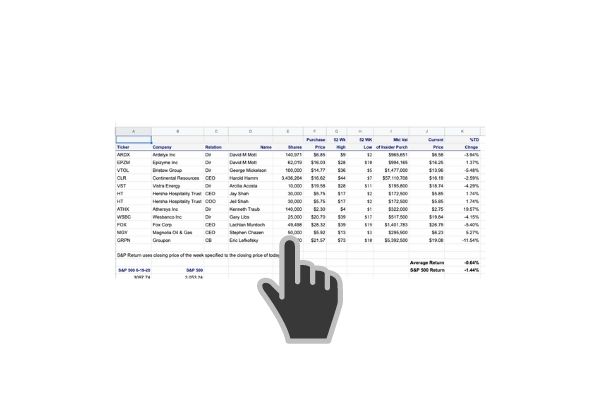For trade details click on this link to the trades
| Company | Ticker | % Change |
| insider-trading/1680048.htm”>MUSTANG BIO Inc | MBIO | 13.46% |
| TUPPERWARE BRANDS CORP | TUP | 9.52% |
| TUPPERWARE BRANDS CORP | TUP | 6.93% |
| HC2 HOLDINGS Inc | HCHC | 6.84% |
| GoHealth Inc. | GOCO | 5.45% |
| GoHealth Inc. | GOCO | 5.45% |
| MYERS INDUSTRIES INC | MYE | 4.14% |
| CROWN CASTLE INTERNATIONAL CORP | CCI | 2.88% |
| Keurig Dr Pepper Inc. | KDP | 2.52% |
| TIPTREE Inc | TIPT | 1.79% |
| COMSCORE Inc | SCOR | 0.01% |
| Limoneira CO | LMNR | -0.75% |
| VICI PROPERTIES Inc | VICI | -0.81% |
| ORACLE CORP | ORCL | -1.50% |
| APARTMENT INVESTMENT & MANAGEMENT CO | AIV | -3.06% |
| TUPPERWARE BRANDS CORP | TUP | -3.99% |
| Biohaven Pharmaceutical Holding Co Ltd. | BHVN | -7.28% |
| Bandwidth Inc. | BAND | -7.92% |
| Asana Inc. | ASAN | -8.16% |
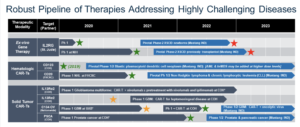
CEO Manuel Litchman purchased 165,562 of Mustang BIO, Inc at $3.12. MBIO is a clinical-stage biopharmaceutical company focused on translating today’s medical breakthroughs in cell and gene therapies into potential cures for hematologic cancers, solid tumors, and rare genetic diseases.
Lichtman has purchased MBIO three times prior to this buy. Director Dr. Lindsey Rosenwald purchased 100,000 shares at $2.66 back in December. This all shows a lot of conviction in this pre-revenue biotech. Lindsay A. Rosenwald is an American doctor and finance expert in asset management, investment banking, venture capital and direct investing within the biotechnology and life-sciences industry,[1][2] and one of two co-founders and partners of Opus Point Partners,[3] an asset management company that invests in the healthcare space, primarily in biotechnology. He has been a prolific founder of development-stage biotech companies.
Rosenwald has started many biotechnology companies who have over 100 licensed clinical-stage medicines.[4] Many of those drugs were approved by the United States Food and Drug Administration as well as in foreign countries. One medicine was approved for Acute promyelocytic leukemia, a routinely fatal disease, that has cured many thousands of incurable patients over the last decade and continues that achievement today, marking a change to how this disease is treated. Another cancer drug developed by one of his start-up companies is today a near billion dollar-selling drug for prostate cancer. Additionally, that company was the first company to be acquired for approximately $1 billion after only phase 2 studies.[5] Other drugs approved by the United States and many other countries include drugs for schizophrenia, fibromyalgia, obesity, influenza, and infant respiratory distress syndrome.
Gene therapy is one of the hottest and most promising areas in biotech but largely unproven. Mustang Bio will have several read-outs from drug trials this year, including rare genetic diseases, myeloma, breast cancer, and prostate cancer. Normally phase one is more about safety but we expect to hear about efficacy as well. Biotechs peaked out the first week in February along with many of the high growth tech stocks as the market began a significant rotation from growth to value, from the stay-at-home stocks to the back to normal stocks. Biotechs got lumped into this momentum shift. We own MBIO and CASI, both small-cap biotechs with significant insider buying.

Director Richard Goudis bought 20,475 shares of Tupperware Brands Corp at $24.36. The CEO also bought 20,000 shares at $24.95 as well the President buying 3000 shares.
TUP is an American multinational multi-level marketing company. The company’s main focus is kitchen and household products, and it is particularly known for its line of plastic containers for food storage and preparation. Home stocks are hot and judging by William’s Sonoma latest quarter and the way Lowe’s ended the week. Numerous Tupperware insider buys this week, we expect more gains from Tupperware.
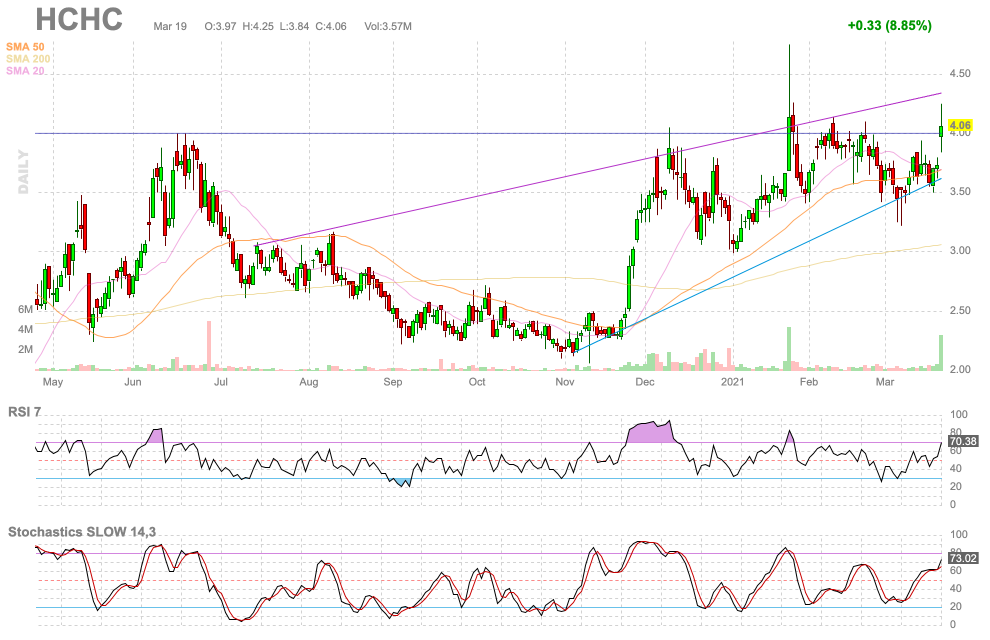
Director and 10% shareholder, Avram Glazer purchased 2,164,108 shares of HC2 Holdings Inc at $3.80. HCHC through its subsidiaries, provides construction, insurance, life sciences, broadcasting, and other services in the United States, the United Kingdom, and internationally. HC2 Holdings Inc., formerly known as Primus Telecommunications Group, Inc., is a public financial services company. The company was renamed HC2 Holdings, Inc in April 2014 after HRG Group Inc. acquired a 40.5% stake in the company, changing HC2’s Stock Market ticker on the NYSE to HCHC.
Avram A. “Avie” Glazer is an American businessman, a member of the Glazer family, who owns the Tampa Bay Buccaneers of the National Football League and hold a majority ownership stake in English football club Manchester United F.C.
This is a complicated story. Reading from the last earnings press release ”
The new HC2 has a sharpened strategic focus on the three key business areas which we believe will drive growth and increased stakeholder value: Infrastructure, Life Sciences and Spectrum,” stated Avie Glazer, Chairman of HC2. “Each of these operating segments contains best in class assets: Infrastructure is one of the largest steel fabrication and erection companies in the U.S., Life Sciences currently includes two breakthrough healthcare technologies, and Spectrum owns and operates the largest broadcast station group in the U.S. HC2 leadership is committed to supporting their success by fueling their organic and inorganic ambitions, and if and when appropriate, looking for alternative approaches to unlock value.”
“We have also reached a milestone in terms of the financial position of HC2,” added Wayne Barr, Jr., HC2’s Chief Executive Officer. “As we continue on a path towards our optimal capital structure, the actions we have taken to monetize certain assets, refinance holding company debt and reduce corporate expenses have significantly increased our liquidity, flexibility, and optionality. There is clear alignment in this endeavor among management, our board and our stakeholders.”
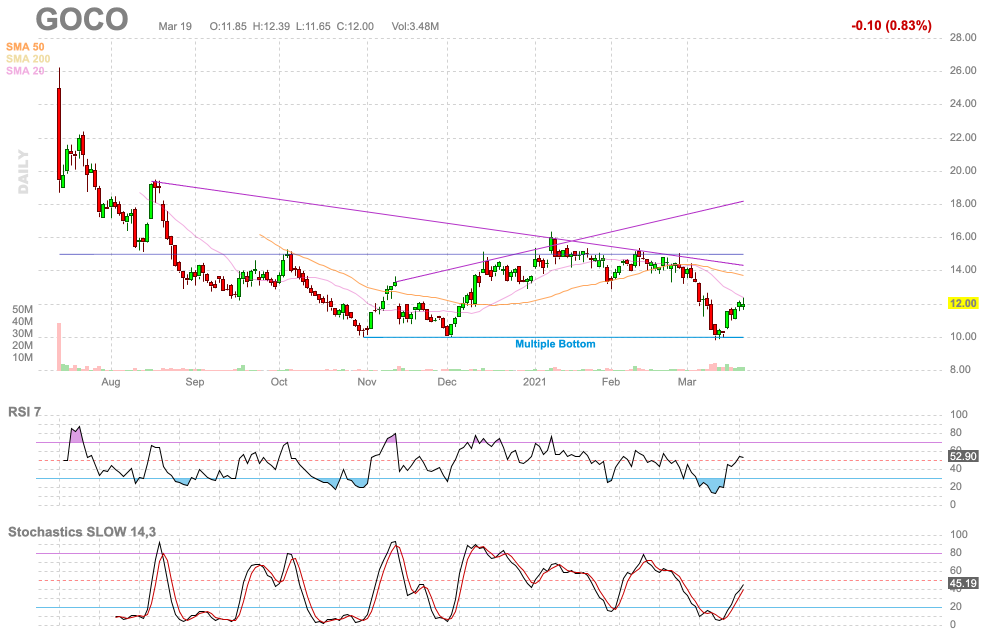
Chief Strategy Officer and 10% owner, Brandon M. Cruz purchased 178,000 shares of GoHealth Inc at $11.38. GOCO is a leading health insurance marketplace and Medicare-focused digital health company, whose mission is to improve access to healthcare in America through its cutting-edge technology, data science and deep industry expertise. Cutting through the jargon, the Company is the largest and most profitable DTC Medicare enroller with 730,000 submissions in 2020 . Their tech-enabled telesales agents are able to help consumers shop for the right plan to fit their unique needs, and do so from the safety and comfort of their homes.
From the 4th quarter press release on March 8th, “Clint Jones, co-founder and CEO said, “GoHealth’s fourth-quarter revenue growth of 55% was driven by 75% revenue growth in our Internal Medicare segment, including LTV expansion of 5%. These excellent top-line results reflect the great work of our agent force and a continuation of the strong full-year trends where we grew revenue 63%, powered by a doubling of Internal Medicare revenue and leading to top-tier adjusted EBITDA margins of 31%.
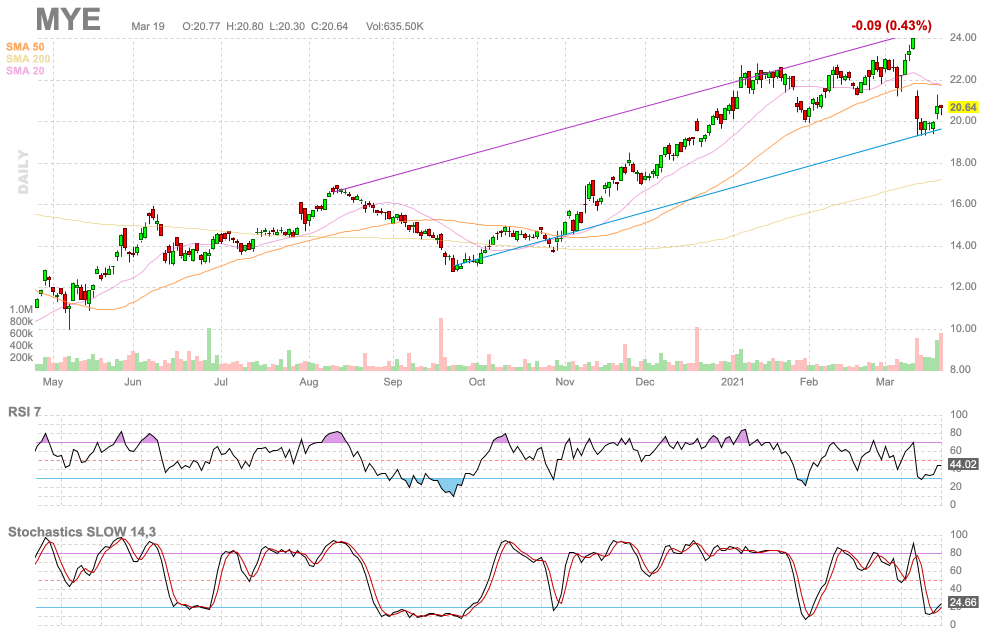
Director Ronald Defeo bought 10,000 shares of Myers Industries, Inc at $19.80 per share. MYE manufactures and sells polymer products for industrial, agricultural, automotive, commercial, and consumer markets in the United States and internationally. It operates through two segments, material handling and distribution.
As you can see MYE has a nice chart, moving nicely up over the last year. It looks like Defeo is taking advantage of a recent price.

Director Martin Landis purchased 1,180 shares of Crown Castle International Corp at $160.99. CCI operates and leases more than 40,000 cell towers and approximately 80,000 route miles of fiber supporting small cells and fiber solutions across every major U.S. market.
We’ve been trading CCI for most of the last 12 months and has been a consistent moneymaker for us paying a nice dividend. I don’t suspect it will break out of its range of $155-$165 without significant news or market sentiment change about the direction of interest rates. It’s at the top of the range and we would not buy it here.
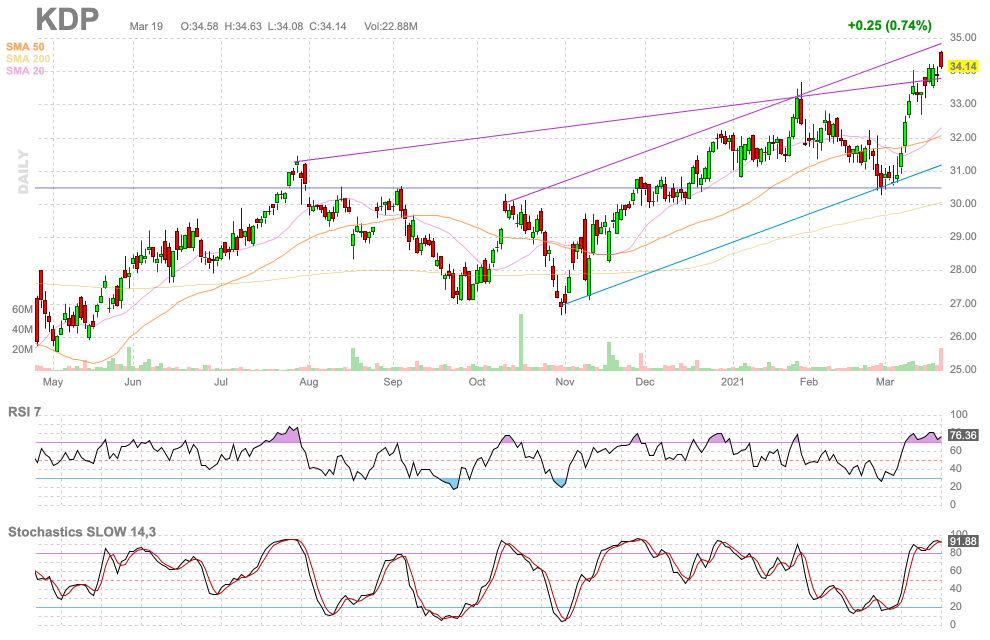
Chief Strategy Officer, Justin Whitmore, bought 37,384 shares of Keurig Dr Pepper Inc at $33.30. KDP, formerly Keurig Green Mountain and originally Green Mountain Coffee Roasters, is a publicly-traded American beverage and beverage-maker conglomerate that sells coffee, other beverages, and Keurig brewers.
KDP has been a steady grower in the consumer group outperforming its peers although not the kind of stock that gets me excited. I see limited upside, perhaps 5-15% per year with very moderate risk.
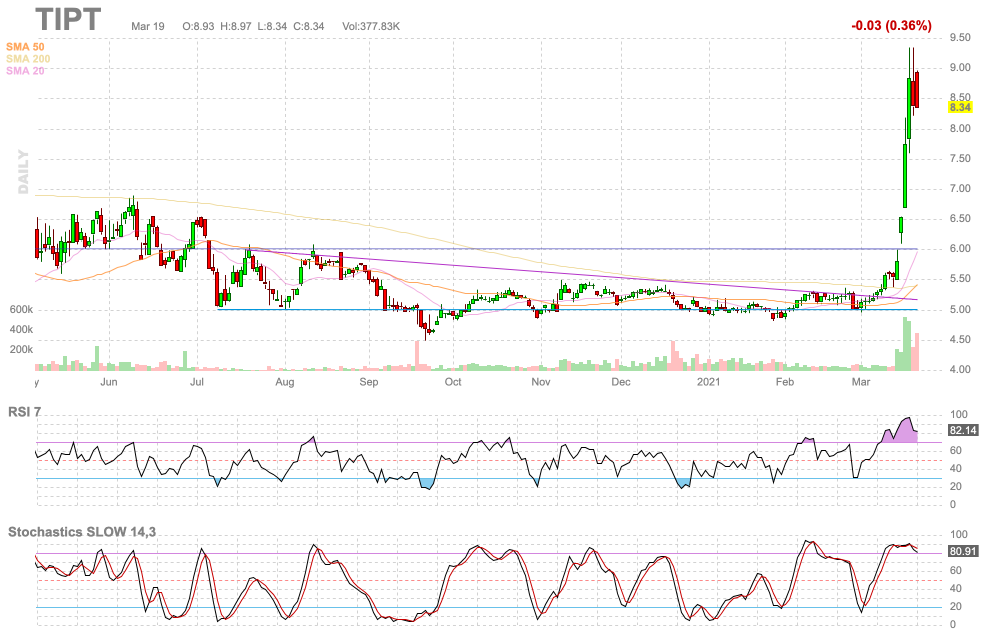
Arif Inayatullah, a 10% shareholder, purchased 85,000 shares of Tiptree Inc at $8.19. Through its subsidiaries, TIPT underwrites and administers specialty insurance products and provides niche commercial and personal lines of insurance primarily in the United States.
Tiptree is a holding company that combines insurance operations with investment management expertise. Their principal operating subsidiary is a leading provider of specialty insurance products and related services. They recently announced a planned IPO spin-off of Fortega, a specialty insurer. That combined with the insider buy lit a match underneath the stock.
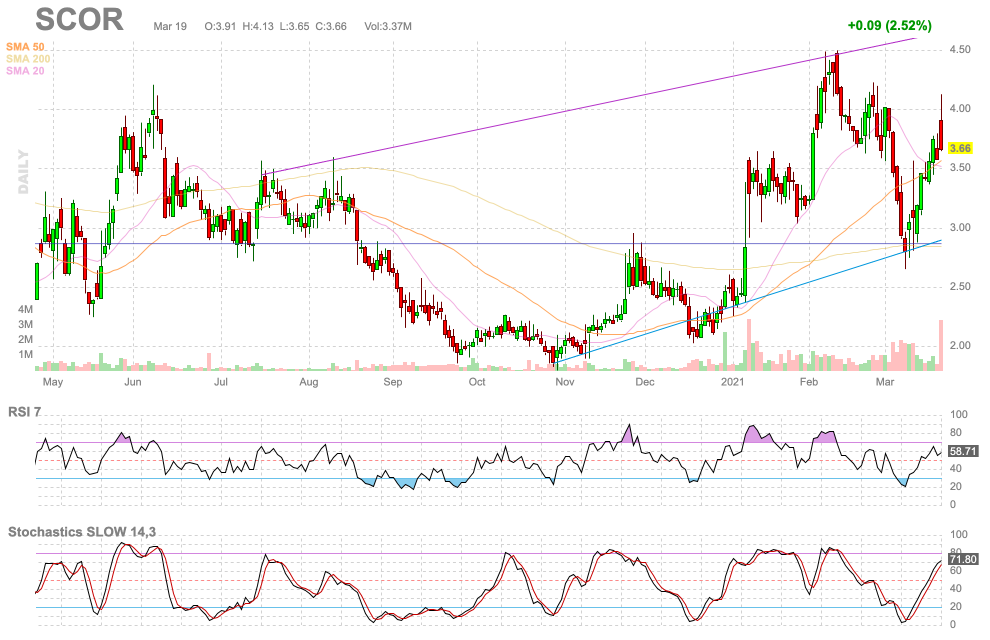
Director Paul Livek bought 200,000 shares of COMSCORE, Inc at $3.66. SCOR operates as an information and analytics company that measures advertising, consumer behavior, and audiences across media platforms worldwide. Measuring movie viewership from more than 95% of the global box office, Comscore could be a secondary play on movie theatres opening back up.

Director Jose De Jesus Loza purchased 11,000 of Limoneira Co at $17.35. He also bought 7500 shares at $17.38LMNR is an agribusiness and real estate development company, which engages in the innovation of the agricultural citrus industry in California.
n addition to agricultural investments, Limoneira has a long history of community building, and new live-walk-work neighborhoods are close to shovel ready. Commercial and residential income-producing and for-sale properties round out our portfolio.
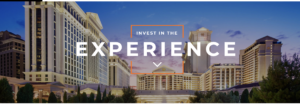
Director James Abrahamson purchased 13,200 shares of Vici Properties Inc at $28.26. This is the 3rd buy by Abrahamson, a big vote of confidence. He purchased 10,000 shares at $25.15 in September and 5100 shares at $23.92 in November. VIVI is an experiential real estate investment trust that owns one of the largest portfolios of market-leading gaming, hospitality and entertainment destinations, including the world-renowned Caesars Palace. Casino stocks have had a big comeback in anticipation of Covid reopening. VICI just notched an all-time high in stock price. The REIT yields an attractive 4.17% yield.
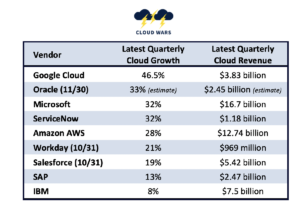
Director Alison Fairhead bought 10,242 shares of Oracle Corporation at $67.27. ORCL provides products and services that address all aspects of corporate information technology environments, including application, platform and infrastructure. There are two obvious winners in the transformation of the corporate data center to the could. Amazon’s AWS which is the gorilla and Microsoft Azure nipping at the gorilla’s heels. In the distance is fast growing Google Cloud and Oracle. According to Bob Evan’s Cloud Wars,. “As I’ve said before, I don’t think the world has ever seen a growth market like what we’ve witnessed over the past few years in the Cloud Wars.
And its impact is simply staggering: sustained and accelerating growth that has created many hundreds of billions of dollars of wealth spread across a huge number of people; global impact across every industry; ramifications for every single person on Earth as cloud technology impacts how we live, work, play, learn and dream; and a leveling effect that accelerates entrepreneurship by putting into the hands of even tiny companies computing power and AI solutions and ML tools and innovation cycles that in the past were available only to the largest corporations on Earth. ”
Oracle’s databases are at the heart of many major corporations. Oracle is a leader in the hybrid cloud as large companies move part of vital operations out of their own data centers into the cloud.

Director Terry Considine bought 300,000 shares of Apartment Investment and Management Co at $5.72. Operating as a real estate investment trust, AIV engages in the acquisition, ownership, management, and redevelopment of apartment properties. AIV yields just over 4%. AIV was dropped from the S&P and replaced by Tesla.
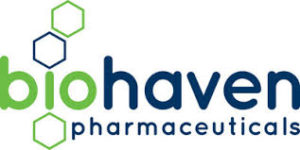
Director John Childs purchased 13,157 shares of Biohaven Pharmaceutical Holding Co Ltd at $76.00. As a clinical-stage biopharmaceutical company, BHVN engages in the research and development of late-stage product candidates targeting neurological diseases, including rare disorders. Childs is a billionaire private equity, best known for his sale of Snapple. Not that it matters much but I found it interesting that the billionaire owner of a Massachusetts-based private equity firm has been wrapped up in a massive prostitution scandal that has already ensnared the likes of New England Patriots owner Robert Kraft and former Citigroup executive John Havens.
Director Brian Bailey bought 1,500 shares of Bandwidth Inc. at $133.79. BAND operates as a cloud-based software-powered communications platform-as-a-service (CPaaS) that offers data Internet, voice/voice over internet protocol, messaging, managed network, and conferencing services. We don’t know enough about this company’s business to have an opinion. Let’s see how Director Bailey’s purchase plays out.
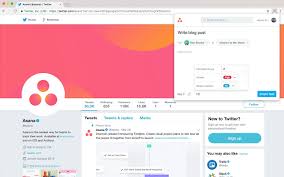
Director Lorrie Norrington bought 6,200 shares of Asana Inc at $32.12. ASAN operates a work management platform that helps teams orchestrate work, from daily tasks to cross-functional strategic initiatives. All the cloud stocks have pulled back from February highs and this might be a good time to revisit Asana. We plan on initiating a position by selling the April 30 puts. If we get put the stock our cost basis will below 30. Asana is recording impressive growth in its cloud-based team management software.
Follow us on Twitter for real time insider buying alerts at https://twitter.com/theinsidersfund
[custom-twitter-feeds]
Insiders sell stock for many reasons, but they generally buy for just one – to make money. You’ve always heard the best information is inside information. Everyone who has any experience at all in the stock market pays close attention to what insiders are doing. After all, who knows a business better than the people running it? Officers, directors, and 10% owners are required to inform the public through a Form 4 Filing any transaction, buy, sell, exercise, or any other with 48 hours of doing so. This info is available for free from the SEC’s Web site, Edgar, although we subscribe to SECForm4 as they provide a way to manage and make sense of the vast realms of data. I’ve tried a lot of vendors and SECForm4 is one of the most customer-friendly and responsive I’ve used.
We publish a subscription newsletter called The Insiders Report. We offer a free 30-day trial so you have nothing to lose by trying it out. Be sure to carefully read the TERMS OF SERVICE.
Another source for insider buying and selling and much more is FinViz Elite. FinViz stands for financial visualization and they do an amazing job of providing reams of data and the tools to help you get to the bottom of it, the information that helps me make informed decisions and probable outcomes. I’ve been using their site for years and it only gets better over time.
This is as close to “insider information” that an ordinary investor is likely to see- and it’s entirely legal.
BEWARE– Following insiders can be hazardous to your financial health unless you know what you are doing. Unlike the raw, unfiltered data, The Insiders Fund blog informs you of the purchases that count, the ones that are just window dressing into deceiving the public that all is hunky-dory, and those that are just flat out other people’s money and should be just discarded like bad fish. As a rule, we only look at material amounts of money, $200 thousand or more, as anything less could just be window dressing.
The bar is different from selling because the natural state of management is to be sellers. This is because most companies provide significant amounts of management compensation packages as stock and options. Therefore, with selling, we analyze for unusual patterns, such as insiders selling 25 percent or more of their holdings or multiple insiders selling near 52-week lows. Another red flag is large planned sale programs that start without warning. Unfortunately, the public information disclosure requirements about these programs referred to as Rule 10b5-1 is horrendously poor. Also planned sales that just pop up out of nowhere are basically sales and are seeking cover under the Sarbanes Oxley corporate welfare clause. I also generally ignore 10 percent shareholders as they tend to be OPM (other people’s money) and perhaps not the smart money we are trying to read the tea leaves on.
Of course, insiders can also be wrong about their Company’s prospects. Don’t let anyone fool you into believing they never make mistakes. No one tracks and understands insider behavior better than us. We’ve been doing it religiously since 2001 when I quit being an insider myself and devoted myself full time to managing my personal investments. They can easily be wrong about how much others will value them, and in many cases, maybe most cases have no more idea what the future may hold than you or I. In short, you can lose money following them. We have and we curse aloud, what were they thinking! Needless to say, past good fortune is no guarantee of future success. We may own positions, long or short, in any of these names and are under no obligation to disclose that. We welcome your comments on our analysis.
This blog is solely for educational purposes and the author’s own amusement. Investing with The Insiders Fund is for qualified investors and by Prospectus only. Nothing herein should be construed otherwise. THE INSIDERS FUND invests in companies at or near prices that management has been willing to invest significant amounts of their own money in. If you would like to hear more about how you can get involved with the Insiders Fund, please schedule some time on my calendar.
Prosperous Trading,
Harvey Sax
The Insiders Fund was the 4th best long-short equity fund in the world in 2019, 4th Best in November 2020, 4th Best in January 2021 (I kid you not)


